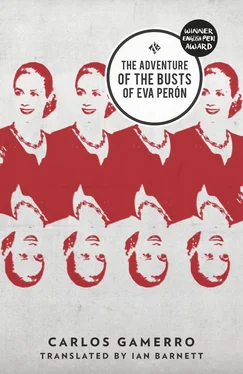Carlos Gamerro - The Adventure of the Busts of Eva Perón
Здесь есть возможность читать онлайн «Carlos Gamerro - The Adventure of the Busts of Eva Perón» весь текст электронной книги совершенно бесплатно (целиком полную версию без сокращений). В некоторых случаях можно слушать аудио, скачать через торрент в формате fb2 и присутствует краткое содержание. Год выпуска: 2015, Издательство: And Other Stories, Жанр: Современная проза, на английском языке. Описание произведения, (предисловие) а так же отзывы посетителей доступны на портале библиотеки ЛибКат.
- Название:The Adventure of the Busts of Eva Perón
- Автор:
- Издательство:And Other Stories
- Жанр:
- Год:2015
- ISBN:нет данных
- Рейтинг книги:3 / 5. Голосов: 1
-
Избранное:Добавить в избранное
- Отзывы:
-
Ваша оценка:
- 60
- 1
- 2
- 3
- 4
- 5
The Adventure of the Busts of Eva Perón: краткое содержание, описание и аннотация
Предлагаем к чтению аннотацию, описание, краткое содержание или предисловие (зависит от того, что написал сам автор книги «The Adventure of the Busts of Eva Perón»). Если вы не нашли необходимую информацию о книге — напишите в комментариях, мы постараемся отыскать её.
Carlos Gamerro's novel is a caustic and original take on Argentina's history.
The Adventure of the Busts of Eva Perón — читать онлайн бесплатно полную книгу (весь текст) целиком
Ниже представлен текст книги, разбитый по страницам. Система сохранения места последней прочитанной страницы, позволяет с удобством читать онлайн бесплатно книгу «The Adventure of the Busts of Eva Perón», без необходимости каждый раз заново искать на чём Вы остановились. Поставьте закладку, и сможете в любой момент перейти на страницу, на которой закончили чтение.
Интервал:
Закладка:
She was seated behind her desk, legs crossed, dressed in an impeccably tailored suit with velvet lapels, hair gathered in a tight bun, and she was radiant: light poured from her eyes, her brow, her mouth and her ears, encircling her like a halo. His mother made to kneel and kiss her hands, telling Ernestito with a tug to do the same, but Eva stopped her with a gesture, and it was she who stood up, walked around her desk and came over to kiss her. ‘Your name’s Eulalia, isn’t it?’ said Eva, without checking her notes (Eulalia? Where on earth had he got that name from?). ‘I’ve seen you at the Maid’s Home on several occasions. So you’re looking for a house. What is it? Don’t you like it where you are? Do they treat you badly? Are you short of anything?’ Stammering, his mother would explain her reasons: the boy’s father worked in the sugar-cane plantations in Tucumán and had nowhere to stay when he came to visit; if she had somewhere of her own, maybe… Eva Perón listened and nodded and smiled; then, half-turning, all briskness and efficiency, to her court of ministers and trade unionists that, only now they were needed, Marroné’s fantasy had summoned: ‘House, furniture, kitchen equipment and refrigerator, and a job in Buenos Aires for her husband. Are you married?’ she asked as an afterthought, and Marroné’s mother shook her bowed head in shame. ‘Make that a bridal gown too.’ And by the following day they were installed in Ciudad Evita, in a smart little Californian bungalow with a front garden, two fully furnished rooms and a refrigerator in the living room; not one of those modern ones with angular, aggressive edges, but a Siam with rounded feminine forms, overflowing with food like a maternal breast, and atop it a little shrine with the portraits of Perón and Eva. His parents’ wedding — she all in white, he uncomfortable but happy in his first dark suit, smoothing his pencil moustache, the pair of them hand in hand in a long line of couples, all dressed the same, like a line of toppers on a wedding cake, a mass proletarian wedding officiated by Eva in the flesh, acting as everyone’s godmother; then the carefree childhood in a modest, but clean and comfortable, home, the games with other children of his kind in the community park (never lonely, with no one for company but the television or the maid in the gloomy Belgrano flat, never the endless Sundays, never children at St Andrew’s, whiter than him, shouting ‘Marron Crappé’). There was more: school, where the teachers read them The Reason for My Life without a twitch of sarcasm; the visits to the Children’s Republic, with its little scale houses, shops, churches and swimming pools; the Children’s Football Championships, where Eva always kicked off and handed out the medals afterwards, and Ernestito, who had scored the winning goal for his team — for in this other life he was a star of the national sport of football, not foreignising rugby — would always cherish the gold medallion with her profile on it, received from her very own hands; the Peronist Christmases with toys from the Foundation at the foot of the tree, and the inevitable cider and panettone on the chequered tablecloth; the Children’s Tourism Plans, the journey on the train where first class was working class; the stay in Chapadmalal, at one of the eight hotel complexes perched atop the cliffs as if standing guard over the people’s happiness, together with other children like Marroné, who, thanks to Evita, were seeing the sea for the first time. Yes, yes, that childhood might have been his had he not been robbed of it by the oligarchy, had he not been torn from his mother’s arms by an elderly couple, incapable, out of selfishness or laziness, of having children of their own until it was too late, then deciding on a whim to get themselves one, like someone buying a puppy in a pet shop.
And at that point Marroné was at last granted the vision of the face of his true mother: not the face of that vaguely affectionate, always distant lady that popped up now and then to keep an eye on the maids and lecture them on how to bathe him, dress him and feed him, but the brave, obscure woman who had borne him in her belly for nine months, perhaps trekking long distances on her journey from the countryside to the city (he’d got it into his head they were from Tucumán and was surer of it with every passing minute), supporting him with one hand and stroking him with the other while she talked to him. But the dream was shattered no sooner had it begun: she hadn’t the wherewithal to keep him, she was alone in the monstrous, indifferent city. Why hadn’t she turned to Evita? Why hadn’t she taken her helping hand? There was no way of knowing. Yes, there was, he told himself, transforming his despondency into decisiveness. The time had come to ask the questions he never had: he would confront his parents, and if they didn’t talk, there would be birth certificates, adoption records… If she was still alive, he’d find her, go to see her and ask her. Because, while he was ignorant of the motives, there was no doubting the sentiment: he could see her clearly, torn apart by tears after signing, without having looked at the papers they handed to her (perhaps she couldn’t read), then regretting it, trying to go back for him and being held back, first by the strong arm of a head nurse, then ushered out into the street by another younger, pleasanter one, repeating to her ‘It’s better this way’. Marroné’s eyes filled with tears at the imaginary scene. Cradled in the warmth of his lap, the baby had fallen asleep and, all emotion, Marroné swore to him he’d never put him through his own terrible ordeal of orphancy: if Evita wasn’t there, he’d take charge and adopt him — if not as a son, at least as a godson. He’d look after him, watch over him, make sure he wanted for nothing. Because, for all he’d been brought up a bourgeois, his soul was anything but. He was, he realised at last, a Peronist born if not bred. The time had come for him to adopt his true identity. It suddenly became clear, crystal-clear, the reason for his presence in this incredible place, which had at first seemed to him the most foreign and alien of places, and now turned out to be the country of his lost childhood. If his steps had guided him to this shanty town and this house, it wasn’t because he was the victim of circumstances, but because he was following a path. All of this had happened — all of it: Sr Tamerlán’s severed finger, his captivity in the occupied factory, becoming a workers’ leader, the struggle against the forces of the anti-people, the death, or sacrifice as he could see it now, of Paddy, María Eva, El Bebe and so many others, his flight through the mud and water, the very existence of his genteel neighbourhood and this slum, of Montoneros and Sr Tamerlán — so that Marroné could find Marroné. Because he would only find out who he really was when he uncovered the obscure past that had been denied to him, the roots that reached deep into the garbage and the mire. He now also understood the deeper meaning of his mission (which might also be his life’s mission): it was nothing less than to carry the spirit of Eva, embodied in her busts, to the very heart of the corporation. For, being neither us nor them , he was the chosen one, predestined, belonging to both worlds. Like Eva, he was a bridge. Carrying Eva to the corporation, opening the corporation up to Eva: this way capital and labour would march hand in hand rather than be at loggerheads, and this senseless war that had claimed so many victims would come to an end. And, as if blessed by a vision underwriting the truth of his revelation, at that very moment he saw Eva Perón walk past the window of the shack.
8. The Foundation
Marroné dropped the baby unceremoniously into its cardboard box and sped out of the shack, oblivious to its cries, to pursue her down the pitch-black streets. Her dress was embroidered with rhinestones and sequins, her wrists, neck and ears shone with blinding white stones, her platinum hair was tied back in a severe bun and her violet halo banished the impenetrable darkness as she went: it was impossible to lose sight of her. She crossed the mud — furrowed with tyre tracks and pitted with fetid puddles — without so much as staining her lace hem, her feet barely touching the ground. It was definitely her and, more out of an urge to share his astonishment than to corroborate the obvious, Marroné said to a boy of around twelve, the only mortal within earshot out there on the edge of the shanties:
Читать дальшеИнтервал:
Закладка:
Похожие книги на «The Adventure of the Busts of Eva Perón»
Представляем Вашему вниманию похожие книги на «The Adventure of the Busts of Eva Perón» списком для выбора. Мы отобрали схожую по названию и смыслу литературу в надежде предоставить читателям больше вариантов отыскать новые, интересные, ещё непрочитанные произведения.
Обсуждение, отзывы о книге «The Adventure of the Busts of Eva Perón» и просто собственные мнения читателей. Оставьте ваши комментарии, напишите, что Вы думаете о произведении, его смысле или главных героях. Укажите что конкретно понравилось, а что нет, и почему Вы так считаете.











